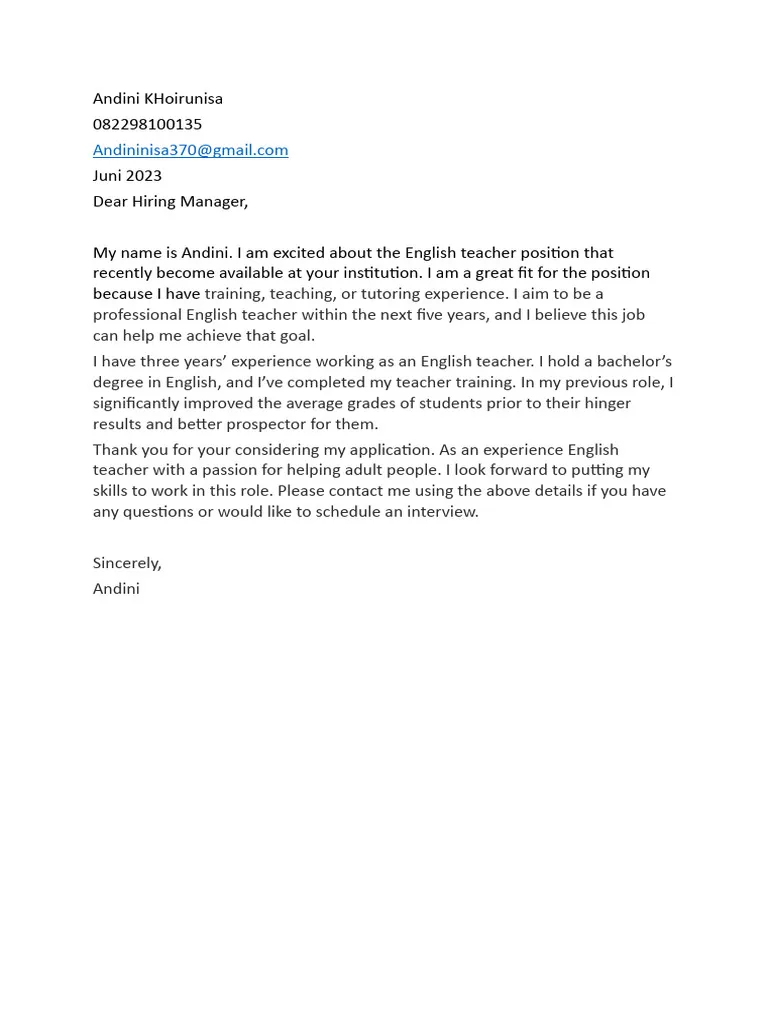Understanding the Importance of a Cover Letter for Teaching English Abroad
Embarking on a journey to teach English abroad is an exciting venture. However, your resume alone isn’t always enough to secure your dream job. This is where a well-crafted cover letter becomes your most powerful tool. It serves as your first introduction to potential employers, giving you the opportunity to highlight your unique skills, experience, and passion for teaching. A compelling cover letter can be the deciding factor between getting an interview and being overlooked. Think of it as your personal sales pitch, allowing you to showcase why you are the perfect fit for the specific teaching position and school. A strong cover letter will not only demonstrate your qualifications but also your personality, professionalism, and enthusiasm, setting you apart from other candidates.
Key Components of a Cover Letter for Teaching Abroad
A successful cover letter for teaching English abroad is more than just a formality it is a strategic document that requires careful attention to detail. The structure of your cover letter should be clear, concise, and tailored to the specific job and school. Ensure you include all essential elements to create a strong first impression and make a convincing case for why you are the best candidate for the position. These key components work together to present a comprehensive picture of your qualifications and make a lasting impact on the reader.
Your Contact Information
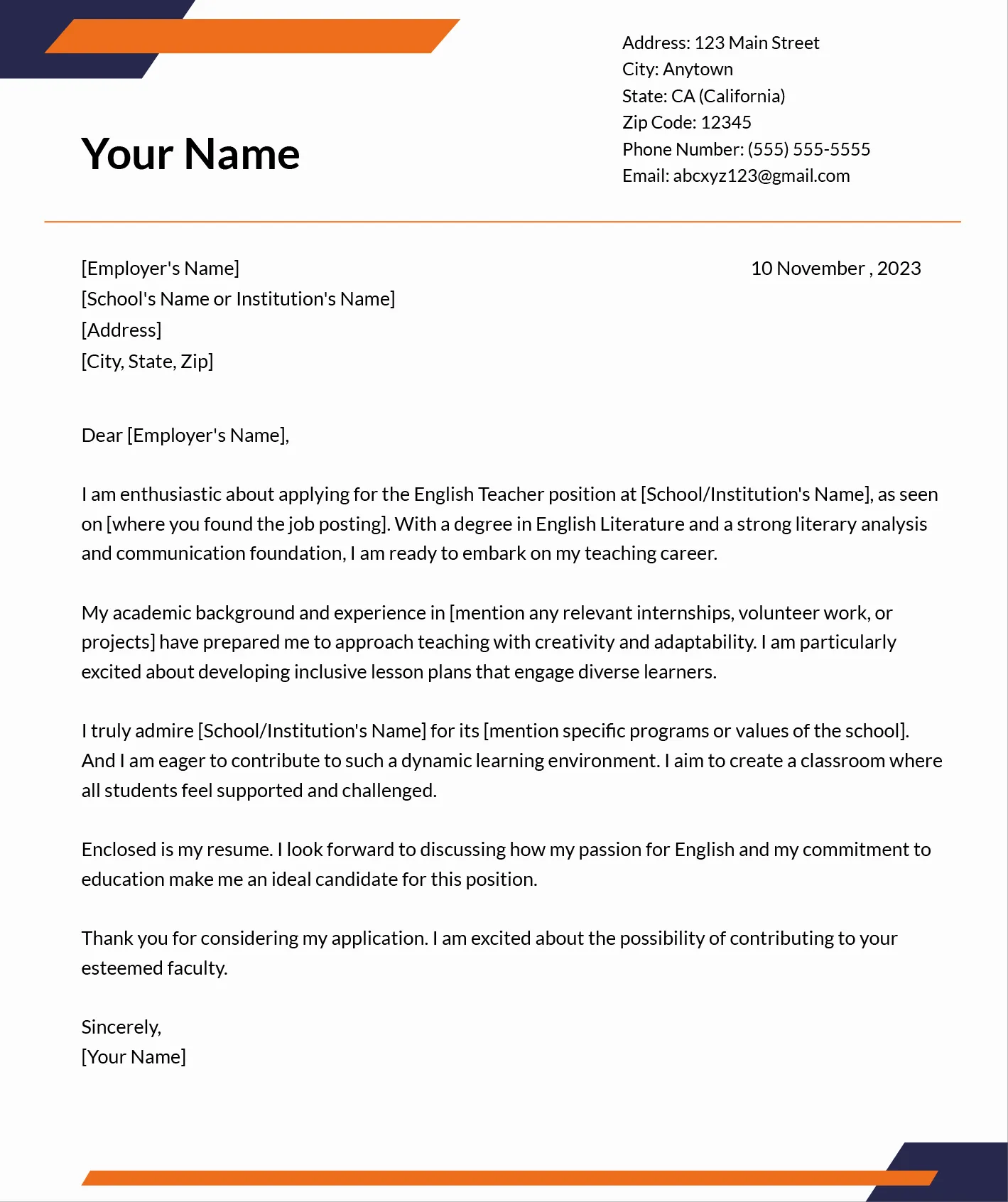
Start with your full name, address, phone number, and professional email address at the top of your cover letter. This ensures that the hiring manager knows how to easily contact you. Use a professional email address that includes your name, rather than a casual or unprofessional one. Ensure your contact information is accurate and up-to-date to avoid any missed opportunities due to incorrect details. Double-check all information before submitting your cover letter to ensure that it is flawless.
The Greeting
Addressing the hiring manager by name shows that you have done your research and are taking a personalized approach. If you know the name of the hiring manager, use it. If not, use a general greeting like “Dear Hiring Manager.” Avoid generic greetings such as “To Whom It May Concern,” as they lack personal touch. Always double-check the correct spelling of the name. When applying for jobs, always prioritize personalizing your introduction to express your interest.
Crafting a Compelling Opening Paragraph
The first paragraph is your chance to grab the reader’s attention. State the position you are applying for and how you found it. Briefly mention your key qualifications and why you are excited about the opportunity. This sets the tone for the rest of your letter and encourages the hiring manager to read on. Make your opening statement strong and succinct, using action verbs to capture the reader’s interest immediately. The introduction should demonstrate your enthusiasm and make a strong initial impression, setting the stage for a compelling application.
Highlighting Your Qualifications and Experience
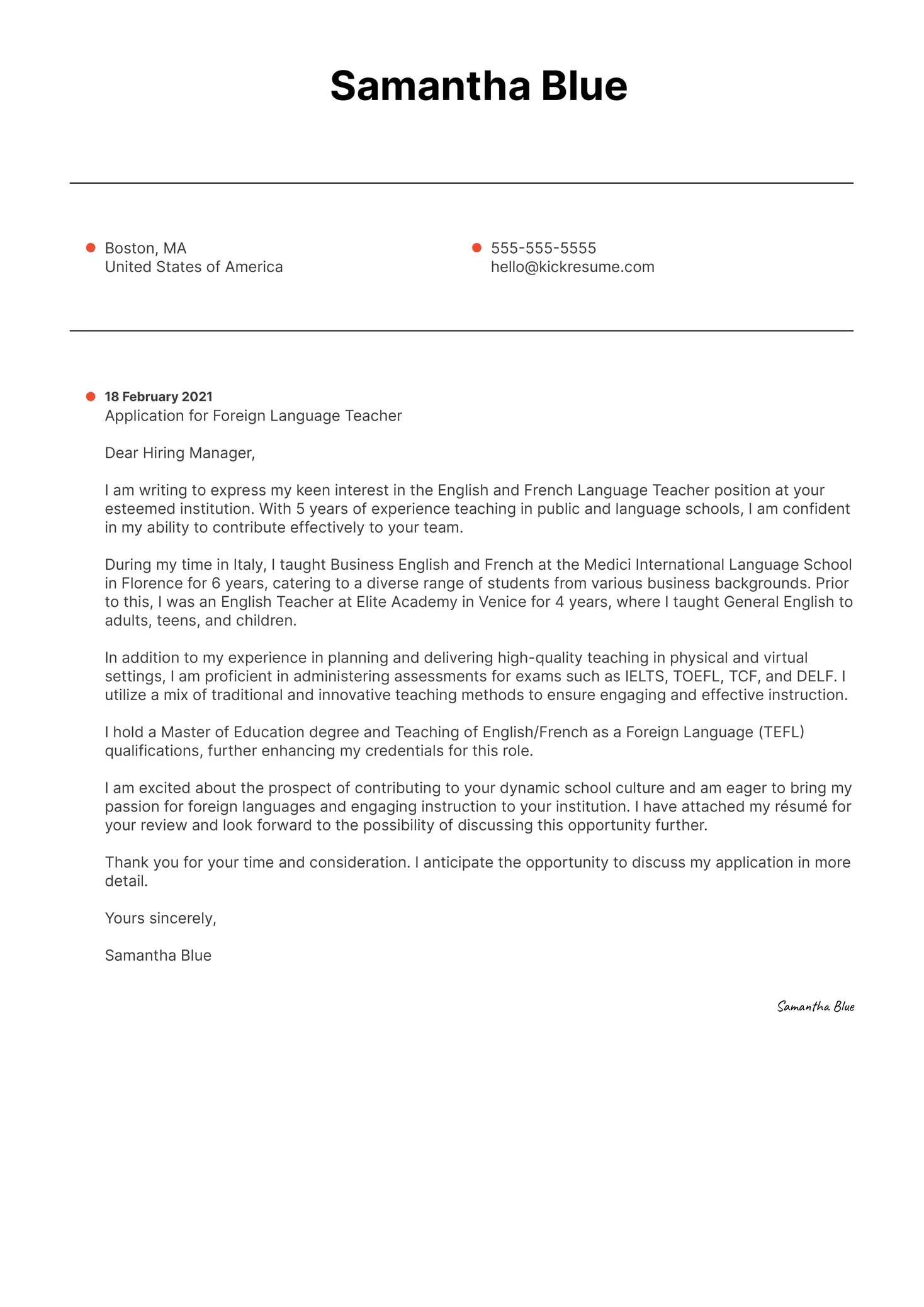
This is where you showcase your relevant skills and experience. Provide specific examples that demonstrate your ability to teach English effectively. Focus on the qualifications most relevant to the job description. Use quantifiable achievements, such as the number of students you have taught or the improvements in their language skills. Always focus on what makes you unique and how you can benefit the school or institution. Showcasing your accomplishments with concrete examples provides a clear picture of your capabilities.
Education and Certifications
Detail your educational background, including any degrees, diplomas, and TEFL/TESOL certifications you hold. Mention the name of the institution, dates attended, and any specializations. Emphasize certifications relevant to teaching English abroad, such as TEFL, TESOL, or CELTA. Ensure that you clearly present your academic qualifications in a way that resonates with the requirements of the specific job. Always prioritize your education and qualifications in an easy-to-read format.
Teaching Experience
Describe your teaching experience, including the name of the schools or institutions where you have taught, the subjects you taught, and the grade levels. Highlight any special programs or initiatives you were involved in. Whenever possible, quantify your accomplishments and describe your achievements. Mention any relevant skills, such as experience with curriculum development, lesson planning, or classroom management. Always provide specific details that showcase your ability to excel in a teaching role.
Showcasing Your Skills and Attributes
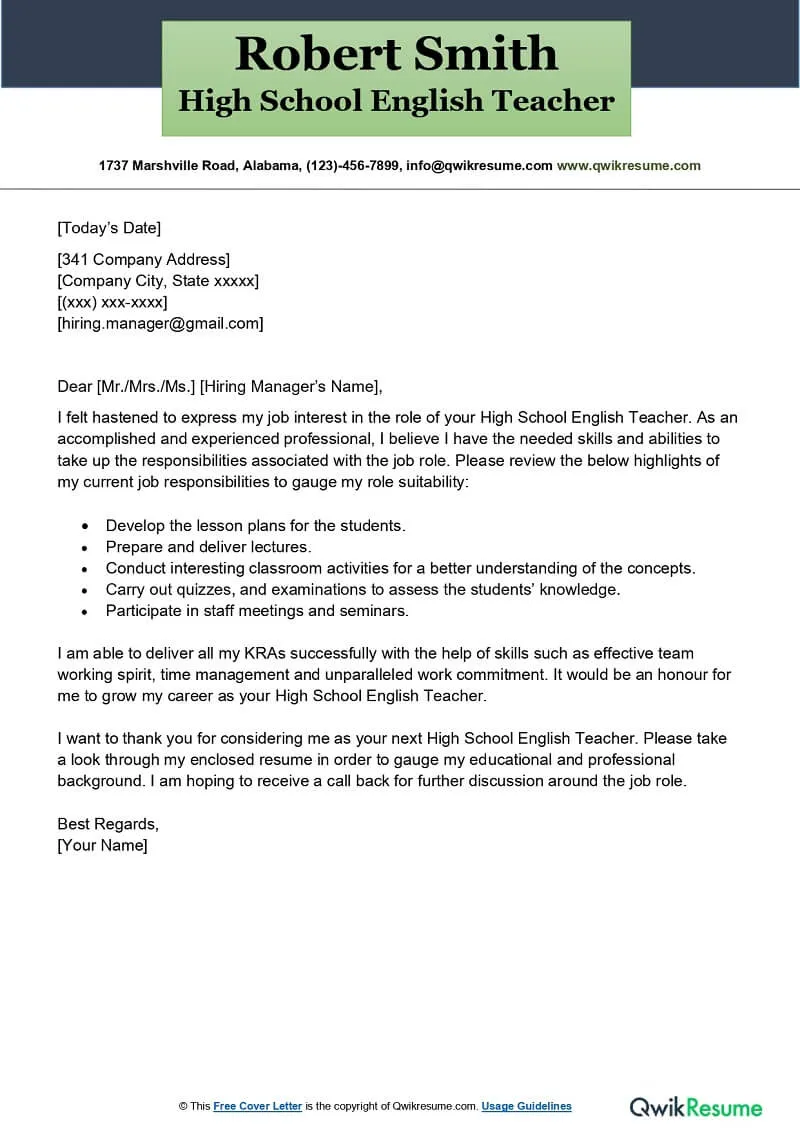
Beyond qualifications, highlight skills like communication, creativity, and cultural sensitivity. Use examples to demonstrate how you’ve used these skills effectively in the classroom. Show your ability to engage students, manage diverse classrooms, and create a positive learning environment. Demonstrate your ability to tailor your teaching methods to diverse student needs and foster an inclusive learning environment.
Adaptability and Cross-cultural Communication
Mention your experience in diverse environments and demonstrate your ability to adapt to different cultures. If you have lived or traveled abroad, mention your experiences and how they have broadened your perspective. Explain how you handle cross-cultural communication challenges. Demonstrate that you value and understand cultural differences, as it is essential for success in the classroom. Share instances of overcoming cultural barriers to illustrate your commitment to cultural sensitivity.
Classroom Management and Lesson Planning
Provide examples of successful classroom management techniques and your ability to create engaging lesson plans. Share how you ensure a positive learning environment. Discuss your approach to differentiating instruction to meet the needs of all students. Highlight your ability to develop creative and effective lessons that keep students engaged. Be specific about how you have dealt with challenging classroom situations and implemented creative solutions.
Demonstrating Your Passion for Teaching
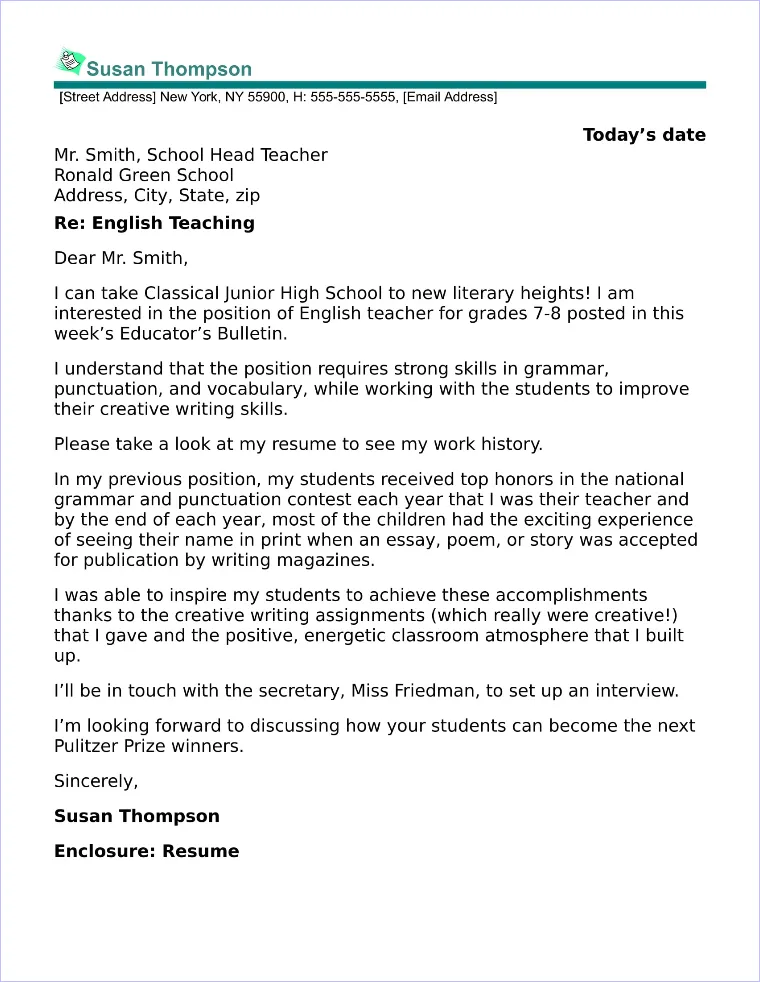
Show your enthusiasm for teaching English, your commitment to student success, and your love for the English language. Share personal anecdotes that highlight your passion. Explain your teaching philosophy, and what motivates you to excel in the classroom. Share how you create a fun and stimulating learning environment for students. Your passion will set you apart from other candidates.
Researching the School and Tailoring Your Letter
Research the school thoroughly. Tailor your cover letter to match the school’s mission, values, and specific requirements. Use the school’s website and other resources to learn about their culture. Showing that you have researched the school demonstrates your genuine interest in the opportunity. Personalize your cover letter to make sure it aligns with the school’s goals, including its teaching philosophy, student demographic, and core values. This personalization indicates you are committed and have a clear understanding of what the school seeks.
Expressing Your Interest in the Position
Clearly state your interest in the specific position you are applying for and why it appeals to you. Explain how your skills and experience align with the job description. Be enthusiastic and demonstrate your understanding of what the job entails. Mention any specific aspects of the role that particularly excite you and that align with your career goals. Demonstrate a clear understanding of the school’s needs and explain how you can help them achieve their objectives.
Mentioning Your Knowledge of the School’s Values
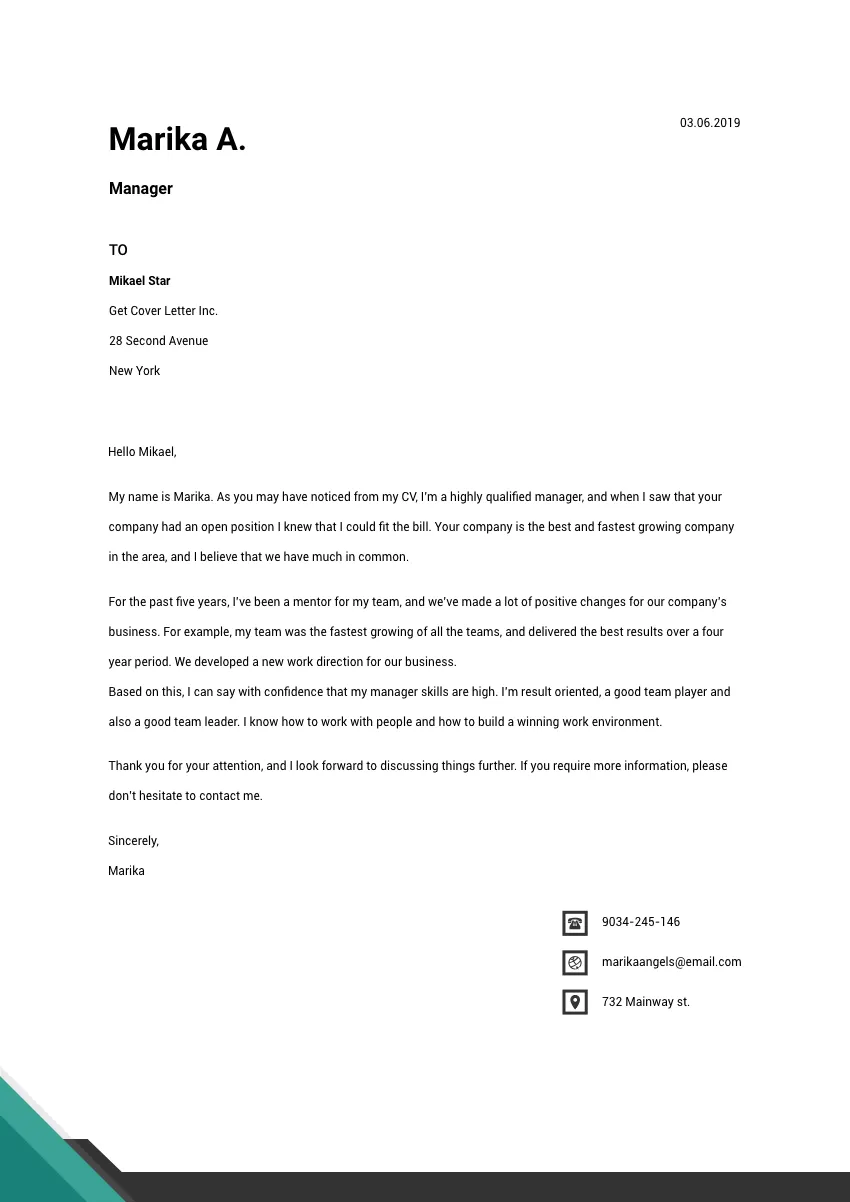
If you know the school’s values or mission statement, reflect them in your cover letter. Explain how your values align with the school’s. Demonstrating that you understand and share the school’s values shows that you are a good fit for the institution. Researching the school’s mission, values, and any unique aspects before you begin writing can significantly boost your application. Integrate the school’s core beliefs and values into your letter to convey your commitment to its objectives.
Writing a Strong Closing Paragraph
Summarize your qualifications and reiterate your interest in the position. Thank the hiring manager for their time and consideration. Keep the tone professional and enthusiastic. Make your ending clear and compelling, providing a strong impression before the hiring manager ends reading. Emphasize your key strengths and reiterate your enthusiasm to the recruiter.
Reiterating Your Interest and Enthusiasm
Restate your interest in the position and express your enthusiasm for the opportunity. Make sure you highlight what attracts you to the school and the role. Express your passion for teaching English and your ability to create a great learning experience for students.
Including a Call to Action

Include a clear call to action, such as inviting the hiring manager to contact you for an interview. Make it easy for the hiring manager to take the next step. Clearly state your availability for an interview and provide your contact information one more time. Close by expressing your excitement about the chance to discuss the opportunity further.
Proofreading and Editing Your Cover Letter
Carefully proofread and edit your cover letter for any spelling, grammar, and punctuation errors. Ensure that your language is clear, concise, and professional. Ask a friend or colleague to review your cover letter to catch any mistakes you might have missed. Proofreading ensures your cover letter is polished and professional. The most common errors can easily be avoided through careful review and editing. Before submitting, ensure the cover letter is a reflection of your writing capabilities.
Formatting and Presentation Tips
Use a professional and easy-to-read font, such as Times New Roman or Arial. Use appropriate margins and spacing for a clean layout. Keep your letter to one page in length. Use bullet points to make your achievements easily readable. Proper formatting is essential to make your cover letter visually appealing and professional.
Common Mistakes to Avoid
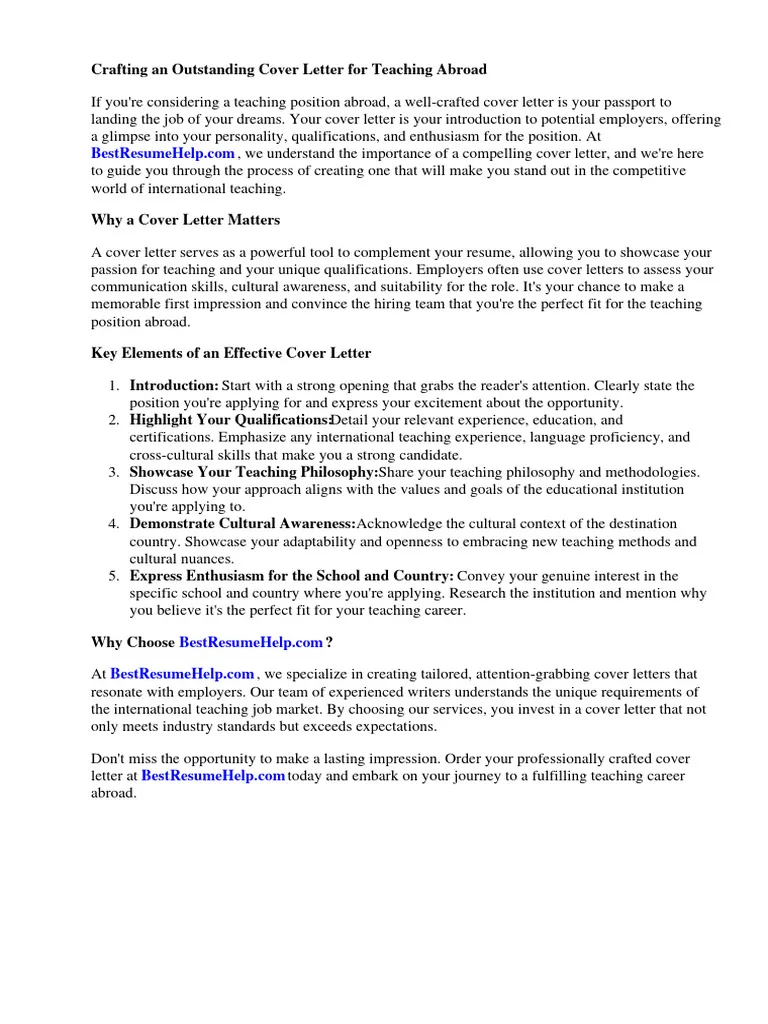
Avoiding common mistakes can greatly increase your chances of success. Be mindful of the following points to ensure your application is the best it can be.
Overusing Clichés
Avoid using clichés and generic phrases that make your letter sound unoriginal. Be specific and use unique descriptions. Show, don’t just tell, by giving examples of your accomplishments. Clichés make it difficult for you to stand out among other applicants. Always avoid the use of phrases that may sound generic and non-descriptive.
Typos and Grammatical Errors
Always proofread your cover letter carefully to eliminate any typos or grammatical errors. Incorrect grammar can damage your credibility. Errors make you appear less attentive and unprofessional, potentially leading to your application being discarded. Ask a friend or colleague to review your letter to make sure you didn’t miss anything.
Generic and Vague Language
Avoid using generic and vague language that does not provide any specific details about your skills and experience. Be specific and use concrete examples to demonstrate your abilities. When applying, use concise, actionable language to ensure that your application shows your capability.
Final Thoughts and Next Steps
Writing a compelling cover letter is essential for landing your dream job teaching English abroad. By following these tips and tailoring your letter to each specific opportunity, you can significantly increase your chances of success. Remember to research the school, highlight your unique skills and experience, and demonstrate your passion for teaching. Good luck with your job search! Always focus on showcasing your unique strengths and experiences to stand out from the competition. Good preparation is crucial to success.
